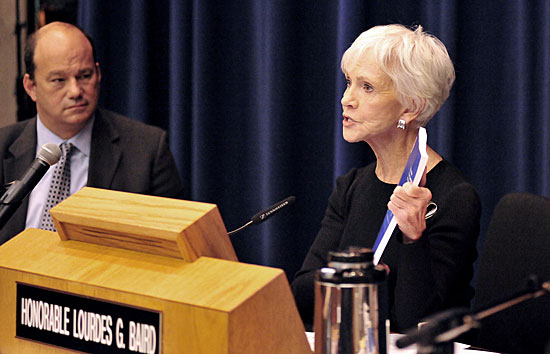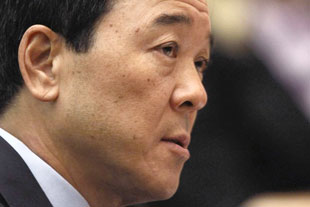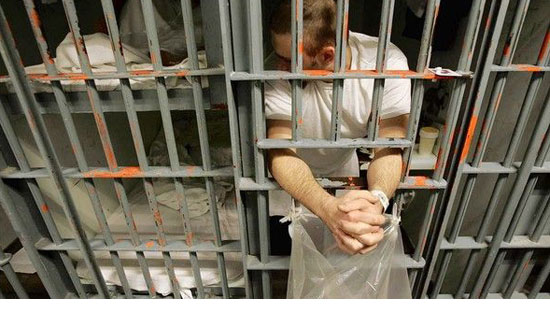
Commission Chair Lourdes Baird says it’s now up to the supervisors and sheriff to enact proposed reforms.
After nearly a year of investigation, the Citizens’ Commission on Jail Violence released its final report on Friday, concluding that comprehensive reforms are needed throughout the Los Angeles County Sheriff’s Department because Sheriff Lee Baca and some of his top managers failed to confront persistent deputy brutality behind the bars.
“The commission heard repeated and consistent accounts of leadership failings in the department over a period of years,” the seven-member panel wrote. “Thus, it is not surprising that supervisors struggled to control deputy insubordination, inappropriate treatment of inmates, and aggressive conduct both on and off duty by deputies working in Custody.”
(Read the executive summary and entire report.)
The commission, which was appointed last October by the Los Angeles County Board of Supervisors, was unsparing in its criticism of Baca and his second-in-command, Paul Tanaka.
“Both Sheriff Baca and Undersheriff Tanaka have, in different ways, enabled or failed to remediate overly aggressive deputy behavior as well as lax and untimely discipline of deputy misconduct in the jails for too long.”
What’s more, according to the report, Baca failed to hold Tanaka and other senior leaders accountable for serious lapses in conduct and judgment, “thereby sending a troubling message to a department in need of a clear directive that accountability is expected and will be enforced at all levels.”
During the commission’s Friday meeting at the downtown Hall of Administration, the strongest rebuke of Baca among the panelists came from retired federal judge Robert Bonner.
“The fact is that the sheriff is not someone as a manager who wanted to hear about problems,” Bonner said. “He seems to have had his head in the sand, dealing with other problems, ones that perhaps interested him more—but not minding the store when it came to running the jail in accordance with lawful and sound use of force policies.”

Sheriff Lee Baca at Men’s Central Jail.
In all, Bonner and his colleagues issued more than 60 recommendations aimed at improving training and accountability within the nation’s largest local jail system. Most significantly, the commissioners called for the creation of an Office of Inspector General, which would essentially consolidate the responsibilities of existing oversight bodies “who suffer from too many gaps among them to effectuate comprehensive and lasting changes in the Department.”
“Too often, the department has paid lip-service to recommendations of these oversight bodies knowing that there has not been sustained follow-up to ensure their recommendations are carried out.”
The proposed Inspector General’s office would report directly to the Board of Supervisors and would operate—in name and function—similarly to the agency that oversees sensitive issues within the Los Angeles Police Department. It reports to the civilian Police Commission.
To enhance accountability within custody facilities, the jail commission also recommended the creation of a new position—assistant sheriff for custody—that would be staffed by “a professional and experienced corrections leader,” presumably someone outside the existing chain of command.
The commission further called for tougher discipline for excessive force and dishonesty, a simplification of the disciplinary system and the creation of a new investigations division within the department that would report directly to a chief.
Ultimately, it is the publicly elected sheriff who’ll decide whether many of the proposals for internal reform will be implemented. Baca, confronted with a cresting controversy over jail violence last year, initiated a series of measures that have significantly reduced the use of excessive force. The commission acknowledged Baca’s efforts but also took a swipe: “Simply stated, the Sheriff did not pay enough attention to the jails until external events forced him to do so.”
Many of the sharply-worded findings in the jail commission’s report were revealed three weeks ago in a series of presentations by the commission’s volunteer staff of lawyers, some of whom are former federal prosecutors and had served on other police reform bodies, including the Christopher Commission, which was created after the 1991 LAPD beating of the late Rodney G. King.

Undersheriff Paul Tanaka. Photo/Los Angeles Times
The lawyers reviewed thousands of documents and interviewed more than 150 witnesses, including current and former members of the Sheriff’s Department. Some of those witnesses testified publicly that Tanaka and his hand-picked subordinates had consistently frustrated their efforts to crackdown on violent deputies.
“Not only did he fail to identify and correct problems,” the commissioners concluded, “he exacerbated them.”
The report also criticized Tanaka for helping to create a perception of “patronage and favoritism in promotion and assignment decisions” in the department.
Tanaka, who’s an elected official in Gardena in addition to his sheriff’s department job, has accepted $108,311 in campaign contributions from 336 Sheriff’s Department employees from 1998-2011, the report said.
“There is a perception among rank-and-file employees that contributing to Tanaka’s campaigns is important to promotional and assignment decisions,” the report said, pointing out that in a few of the races Tanaka was running unopposed and that “numerous LASD contributors did not live in the City of Gardena.”
“Concerns were expressed by employees at almost every level of the department,” the report continued. “Even employees who did not contribute felt pressure to attend campaign events in order to have ‘face time’ with the Undersheriff.”
Tanaka is not alone in accepting campaign contributions from the sheriff’s staff, the report said, noting that Baca also has received at least $97,850 from department staff between 1999 and 2011. However, those contributions made up just 7% of Baca’s overall contributions, whereas staff contributions accounted for about 30% of the campaign funds raised by Tanaka.
The commission noted that there is no formal sheriff’s department policy on accepting campaign donations; Baca has told the commission that he’s in the process of developing one.
Despite the unremittingly grim nature of their findings, the commissioners said they believe their recommendations, if implemented, “can bring about lasting and meaningful changes within the Los Angeles County jails.”
Commissioner Jim McDonnell, the Long Beach police chief, noted in his comments that there has been no great public outcry or groundswell to fix the years of documented problems inside the jails.
“Why is this? The people most directly impacted don’t have a lot of credibility in the eyes of the public, nor does the behavior that got them to county jail generate much in the way of sympathy and support,” he said. “That’s just the reality that we face. That makes the responsibility of this board that much more critical.”
“My concern,” he added, “is that if serious remedial action is not taken immediately, federal authorities may pursue legal action against the county, which would likely result in a consent decree. That would an onerous, labor intensive and very expensive path to reform.”

Posted 9/28/12






